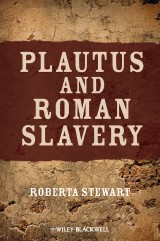Details

Plautus and Roman Slavery
1. Aufl.
|
71,99 € |
|
| Verlag: | Wiley-Blackwell |
| Format: | EPUB |
| Veröffentl.: | 25.04.2012 |
| ISBN/EAN: | 9781118274156 |
| Sprache: | englisch |
| Anzahl Seiten: | 240 |
DRM-geschütztes eBook, Sie benötigen z.B. Adobe Digital Editions und eine Adobe ID zum Lesen.
Beschreibungen
This book studies a crucial phase in the history of Roman slavery, beginning with the transition to chattel slavery in the third century bce and ending with antiquity’s first large-scale slave rebellion in the 130s bce. Slavery is a <i>relationship</i> of power, and to study slavery – and not simply masters or slaves – we need to see the interactions of individuals who speak to each other, a rare kind of evidence from the ancient world.<br /> <br /> Plautus’ comedies could be our most reliable source for reconstructing the lives of slaves in ancient Rome. By reading literature alongside the historical record, we can conjure a thickly contextualized picture of slavery in the late third and early second centuries bce, the earliest period for which we have such evidence.<br /> <br /> The book discusses how slaves were captured and sold; their treatment by the master and the community; the growth of the conception of the slave as “other than human,” and as chattel; and the problem of freedom for both slaves and society.
Preface viii <p><b>Introduction</b> 1</p> <p><b>1 Human Property</b> 21</p> <p><b>2 Enslavement, or “Seasoning” Slaves</b> 48</p> <p><b>3 Violence, Private and Communal</b> 80</p> <p><b>4 Release from Slavery</b> 117</p> <p><b>5 The Problem of Action</b> 156</p> <p>Conclusion 190</p> <p>Bibliography 193</p> <p>Index 215</p>
<p>“Stewart has shown how Plautus and his society were aware of slavery as a complex and contradictory institution that raised perplexing questions in human relations. Slavery informed the lived experience of Plautus’ audience and this reality was embedded in Plautus’ dramatization of master-slave relations. Anyone who seeks to understand the poet and his audience on their own terms should read Plautus and Roman Slavery."<i> (</i><i>Bryn Mawr Classical Review</i>, 1 November 2012)</p> <p>“Summing Up: Recommended. Graduate students, researchers, faculty.” (<i>Choice</i>, 1 November 2012)</p>
<b>Roberta Stewart</b> is Associate Professor of Classics at Dartmouth College. She is the author of <i>Public Office in Early Rome: Ritual Procedure and Political Practice </i>(1998).
This book offers both a complete history of Roman slavery and an investigation into finding and interpreting evidence of it. Evidence on Roman slavery for the period is minimal. To get at its mechanics and underpinnings, we must look at it indirectly. Slavery is a <i>relationship</i> of power, and to study slavery—and not simply masters or slaves—we need to see the interactions of individuals who speak to each other, a rare kind of evidence from the ancient world. <br /> <br /> Plautus’ comedies could be our most reliable source for reconstructing the lives of slaves in ancient Rome. By reading literature alongside the historical record, we can conjure a thickly contextualized picture of slavery in the late third and early second centuries BCE, the earliest period for which we have such evidence.<br /> <br /> The book discusses how slaves were captured and sold; their treatment by the master and the community; the growth of the conception of the slave as “other than human,” and as chattel; and the problem of freedom both for slaves and society.
“A unique discussion of the religious, legal and literary context of slavery in the comedies of Plautus.” – <i>Niall McKeown, University of Birmingham</i><br /> <br /> <p>“Stewart's legal/political approach, and her engagement with current work on New World human trafficking, make this book a must for students of slavery ancient and modern as well as for readers of comedy.” – <i>Amy Richlin, University of California, Los Angeles</i></p> <p>“<i>Plautus and Roman Slavery</i> is that rare thing – a truly original book. This is not the first study to take the comedies of Plautus as historical documents of their own time and society, but it is unusual in placing slavery at the centre of the picture. By adopting methods developed in American slavery studies, and applying them to Plautus' plays, Roberta Stewart succeeds brilliantly in recreating the lived experience of Roman slaves.” – <i>Timothy Cornell, University of Manchester</i></p>
















